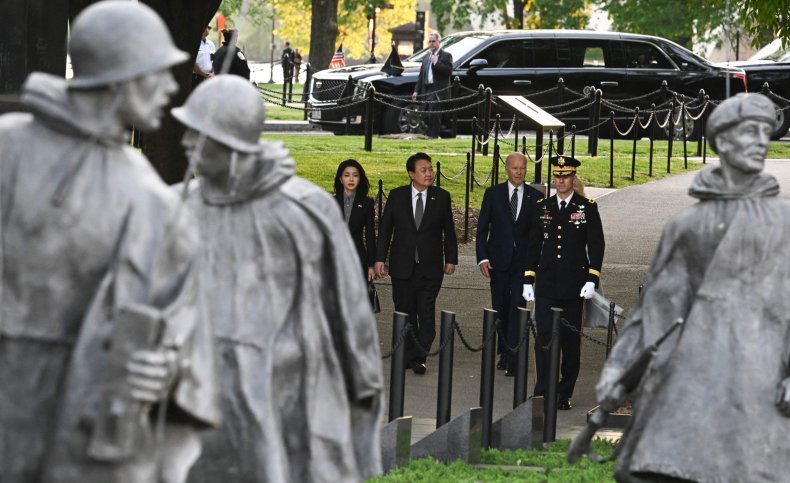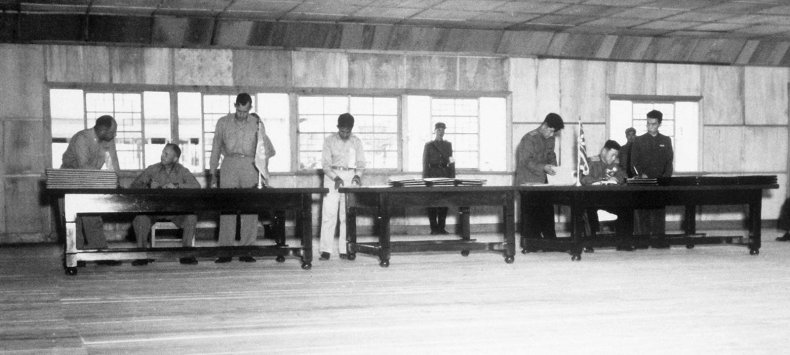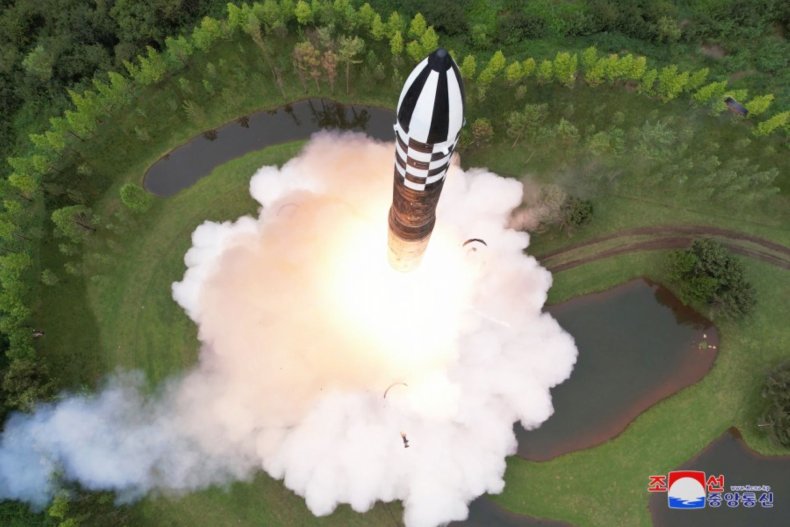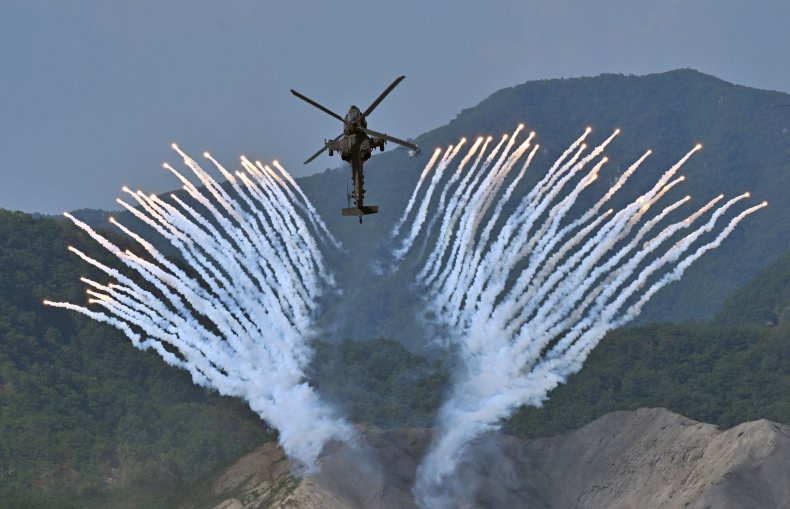Seventy years after an armistice cooled a hot war on the Korean Peninsula, the threat of a new conflagration on this frontline threatens to spark a catastrophic nuclear conflict. And with the United States largely focused on threats posed by Russia in Ukraine and China in Taiwan, a number of former U.S. officials believe that in the absence of a peace treaty it is actually the likeliest flashpoint for such a devastating scenario.
Among them is Dan Leaf, a retired Air Force lieutenant general and former deputy commander of U.S. Indo-Pacific Command.
"We could look at the nuclear stakes and risks and say, 'Well, the Ukraine situation could go nuclear, the China-U.S. competition and a potential conflict with regard to Taiwan could go nuclear,' Leaf tells Newsweek, "but those would require a series of mistakes, misunderstandings and events to get there."
"The reason that the Korea problem is most urgent is that we are one bad decision away from nuclear war," he explains.
But Leaf is also among those who believe that both President Joe Biden and lawmakers have the ability to defuse this situation. Once tasked with delivering nuclear strikes and overseeing intercontinental ballistic missile operations, he is now calling for a legislative effort to prioritize securing a peace treaty with Pyongyang to avert disaster and also potentially pave the way for concessions from North Korea, including in the realm of human rights.
"It's not likely, but it's possible," Leaf says. "And while being the most urgent, it's almost the easiest to address because fixing things with Russia regarding Ukraine, good luck, and the U.S.-China strategic competition, there is no step one, we can't say, 'Let's do this and we'll be on a better path.'"
"We can with North Korea," he adds, "and say, 'End the war.'"

An Undeclared, Unfinished War
Beginning a trend that would set the stage for the U.S. approach to international interventions through to the present day, Washington never formally declared war when entering the battle in Korea on June 27, 1950 alongside United Nations partners against North Korea, which was aided by communist allies China and the Soviet Union.
And yet, many observers at the time proclaimed it be the beginning of World War III, which then-U.S. President Harry Truman predicted would be an atomic war in words that continue to haunt the region to this day.
Throughout three years of fighting, tens of thousands of U.S. troops were killed, along with hundreds of thousands of Chinese soldiers and millions of Koreans, most of whom were civilians.
When the armistice was signed on July 27, 1953, both sides were locked in a stalemate across what would become known as the Demilitarized Zone (DMZ) that runs not far from the original 38th parallel boundary hastily drawn up by the U.S. in the wake of World War II to divide the new Soviet-backed Democratic People's Republic of Korea (DPRK) and U.S.-backed Republic of Korea (ROK).
Inter-Korean tensions continued to fester long after the guns were silenced, outlasting the Cold War that initiated them.
"We act with North Korea like we're still at war," Leaf says. "North Korea acts with us like we're still at war. That's not a way to establish peace when the fundamental assumption is that we're still at war."
And with Beijing, Moscow and Pyongyang now rekindling ties to degrees not seen in decades, in Leaf's eyes a U.S. peace treaty could accomplish another U.S. goal, by serving to "complicate China's strategic calculus" to retake Taiwan.

"The Risk of Hyper-deterrence"
Frank Aum, a United States Peace Institute senior expert who served in various Pentagon roles including special assistant to the assistant secretary for Asian and Pacific Security Affairs and senior adviser on North Korea at the Office of the Secretary of Defense, also outlined a legislative road to peace on the Korean Peninsula.
To pursue it, however, he said the Biden administration would have to be willing to take other measures to demonstrate its commitment to the process.
"It is unrealistic that North Korea will take denuclearization steps first or in the short-term. It is also unrealistic that the U.S. Congress will ever support a peace deal that doesn't include North Korean denuclearization," Aum tells Newsweek. "So, threading the needle may require a process that maintains denuclearization as a long-term, aspirational goal but includes more U.S. concessions and peacebuilding measures on the front-end."
Such steps suggested by Aum include "implementing a moratorium on U.S. strategic asset deployments to the Korean Peninsula, providing humanitarian and COVID vaccine assistance, ending the U.S. travel ban to North Korea, offering partial sanctions relief, and supporting an end of war declaration."
In response, he says "the U.S. should seek North Korea's reaffirmation of the Singapore Statement, which calls for the complete denuclearization of the Korean Peninsula" and then "both sides should take simultaneous, reciprocal actions towards peace and denuclearization."
The June 2018 Singapore Statement signed by President Donald Trump and North Korean Supreme Leader Kim Jong Un marks the apex of diplomacy between the two nations. The historic summit was followed in February 2019 by a second meeting in Vietnam and a third encounter alongside then-South Korean President Moon Jae-in at the DMZ that June, but progress gradually ground to a halt and tensions returned.
Kim Jong Un, grandson of North Korea's founder and wartime leader Kim Il Sung, has since pursued a record number of weapons tests. The U.S. and South Korea, meanwhile, have resumed large-scale military exercises as well as talks of redeploying nuclear assets to their own side of the border.
Aum argues that the risk of conflict reemerging on the Korean Peninsula after seven decades is rooted "in the absence of diplomacy and a desire to improve relations coupled with the overwhelming, narrow emphasis on deterrence, to which the United States, South Korea, and North Korea subscribe today." He warns "the risk of hyper-deterrence is an arms race in the Northeast Asian region and the higher potential for misperceptions and miscommunications to lead to an inadvertent nuclear war."

The View from Washington, Seoul and Pyongyang
Against this volatile backdrop, the Biden administration has continued to emphasize that it is ready to enter into dialogue with Pyongyang "without preconditions," though much of this language has centered around the goal of denuclearization as recently emphasized by White House national security adviser Jake Sullivan.
A State Department spokesperson, however, offered a broader definition when asked by Newsweek about whether this offer may include potential peace treaty talks.
"When we say 'without preconditions,' it means that we would welcome dialogue on any of a wide range of topics of mutual concern," the State Department spokesperson says. "This could include discussion of practical steps both sides could take to address the security situation in the region."
The State Department spokesperson reiterated that "we remain committed to diplomacy, even as the DPRK launches an unprecedented number of ballistic missiles" and that "we have also been clear that we will seek to cooperate on humanitarian issues, regardless of the status of WMD and missile-related discussions."
"Peace and prosperity on the Korean Peninsula is the ultimate goal for the United States in its relationship with the Democratic People's Republic of Korea," the spokesperson adds. "The United States works closely with allies and partners in the region towards greater peace and security in the region."
But the position of Seoul has also shifted. In sharp contrast to Moon's emphasis on inter-Korean diplomacy, South Korean President Yoon Suk-yeol has adopted a harder linen since taking office last year, concentrating his efforts on deterrence and raising awareness of the human rights situation in North Korea.
"North Korea continues provocations, in violation of multiple UN Security Council resolutions," a South Korean Foreign Ministry spokesperson tells Newsweek. "It conducts nuclear and missile threats, escalating tensions on the Korean Peninsula, while refusing offers by the ROK and the US to enter a dialogue without any preconditions."
"Under these circumstances, the top priority is the denuclearization of North Korea, and thus it would be premature to discuss a peace treaty," the South Korean Foreign Ministry spokesperson adds. "As long as North Korea's nuclear and missile threats continue, a peace treaty on paper is merely a false declaratory peace."
The ministry spokesperson also warns such a treaty could actually lead to escalation on the Korean Peninsula.
"Talking about a peace treaty with North Korea in the absence of any progress in denuclearization would only serve to legitimize its nuclear weapons program," the South Korean Foreign Ministry spokesperson asserts. "It could also lead to unnecessary disputes about functions and roles of the UNC and the USFK, which play a critical role in the ROK's security."
Newsweek has reached out to the North Korean Mission to the United Nations for comment.
In a statement published July 17, ruling Korean Workers' Party Central Committee Vice Department Director Kim Yo Jong, who is Kim Jong Un's sister, decried the "absurdity" of calls for "dialogue without any preconditions" and asserted that any "agreements, signed and committed by preceding presidents, are instantly reversed once new regimes emerge" in Washington and Seoul.
"The U.S. should know that its bolstered extended deterrence system and excessively extended military alliance system, a threatening entity, will only make the DPRK go farther away from the negotiating table desired by it," Kim Yo Jong said.
Underscoring current tensions, she warned that "the present situation in the Korean peninsula has reached such a phase that the possibility of an actual armed conflict and even the outbreak of a nuclear war is debated, going far beyond the phase of acute confrontation between the DPRK and the U.S. created in 2017."

Rival Bills and Opposing Visions
With official diplomacy frozen, two very different bills concerning North Korea have already emerged in the House of Representatives. H.R. 1369, introduced in March and known as the "Peace on the Korean Peninsula Act," calls for a formal end to the Korean War. H.R. 3012, introduced in April and known as the "North Korean Human Rights Reauthorization Act," calls for more punitive measures against Pyongyang over its human rights record.
Though the respective sponsors of both bills represent the city of Los Angeles, they have opposing visions of where U.S. policy toward North Korea should lie.
Republican Representative Young Kim, who introduced H.R. 3012, tells Newsweek that the bill "will ensure that human rights remain front and center in U.S. policy on the Korean Peninsula" by "supporting broadcasting efforts to get outside information into North Korea and encouraging the immediate confirmation of a Special Envoy on North Korean Human Rights." She argues that the U.S. "cannot let this issue fall to the backburner as the North Korean people continue to suffer unimaginable oppression."
She's also "adamantly opposed to H.R. 1369."
"Unilaterally declaring an end to the Korean War will do nothing to ensure peace on the Korean Peninsula," Young Kim said. "Why would you cede leverage to Kim Jong Un after he has shown us time and time again that he's an unreliable negotiator, and that he has no real interest in a permanent peace on the Peninsula?"
"We should not declare a formal end to the Korean War without first guaranteeing the complete, verifiable, and irreversible denuclearization of North Korea," she added, "and in my role as Chairwoman of the Indo Pacific Subcommittee, I will do everything in my power to ensure that this bill does not get a vote this Congress."
The prevailing U.S. strategy of seeking a complete, irreversible and verifiable denuclearization of North Korea is often referred to in Washington circles as "CIVD." However, Democratic Representative Brad Sherman, who introduced H.R. 1369, tells Newsweek this approach has thus far been "a failure in terms of making the world safer."
"But it's made the world safer for the politicians and bureaucrats who say it," Sherman said. "Nobody has been criticized for just shouting 'CIVD' as every day North Korea develops more technology, more weapons."
He readily identifies a logic behind engaging with Kim Jong Un, saying "you should talk to your enemies, frankly, those are the people you have to talk to the most." He also views it as important to have a fundamental understanding of where the North Korean ruler is coming from, because "while we know we're the good guys, to Pyongyang we look dangerous, and their nuclear program is what they think is necessary to defend themselves from us."
As such, he is skeptical of any complete disarmament of North Korea, especially given the legacy of U.S. interventions against Iraq and Libya, both of which had previously shuttered their nuclear weapons programs, and even Russia's war in Ukraine, which previously surrendered Soviet-controlled nuclear weapons in exchange for security guarantees. But he does believe reining in Pyongyang's covert and expanding program is necessary to not only limit the number of warheads that the country obtains, but also to prevent such weapons from falling into other hands.
"I can't guarantee that America declaring that we want to negotiate a peace treaty actually gets us a peace treaty. I can't guarantee that a peace treaty is a major step toward resolving the nuclear issue," Sherman said. "It's the lowest cost thing we could do. It doesn't involve risking American life. It doesn't resolve reducing the pressure on the North Korean government through sanctions. It's a step in the right direction."
"It's an important step in a very big issue," he adds. "And the fact that North Korea can or soon will be able to hit Los Angeles with a nuclear missile is enough to say this is important."
"conflict" - Google News
July 26, 2023 at 04:00PM
https://ift.tt/G5Ppymk
How Biden Could End the Korean War and Avoid A Nuclear Conflict - Newsweek
"conflict" - Google News
https://ift.tt/b7uqzvG
https://ift.tt/VYMLDiz
Bagikan Berita Ini














0 Response to "How Biden Could End the Korean War and Avoid A Nuclear Conflict - Newsweek"
Post a Comment